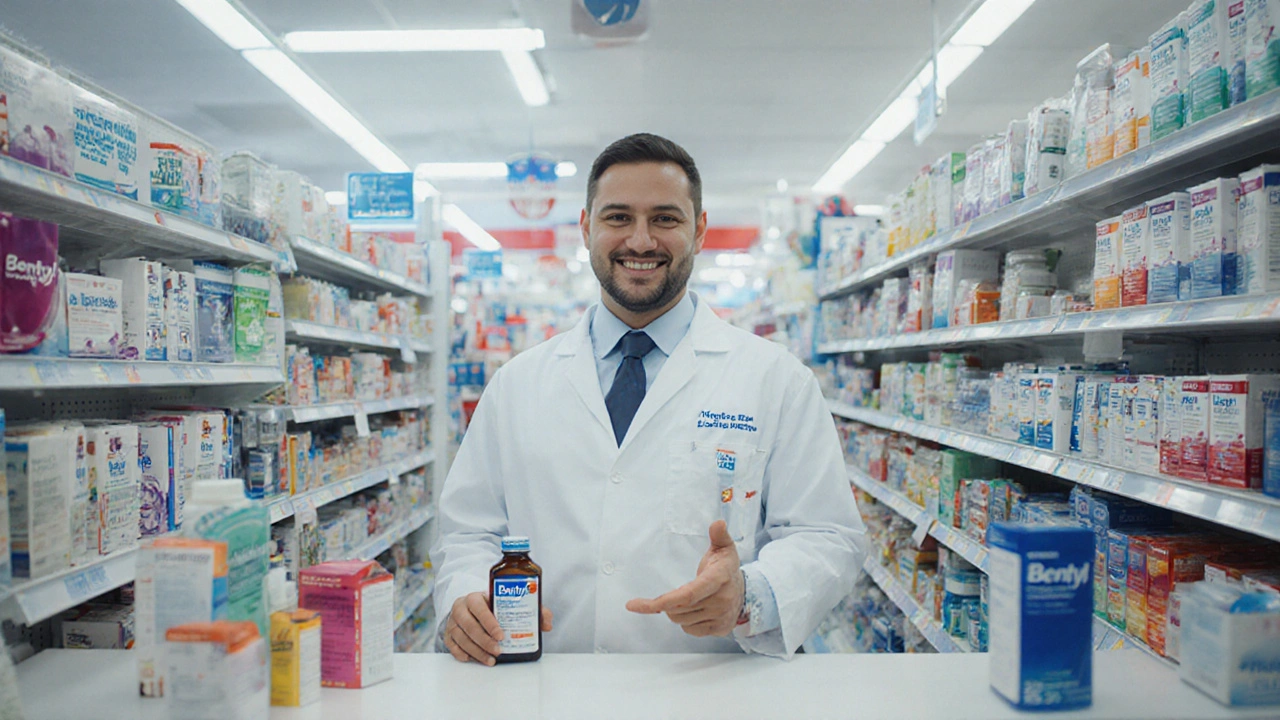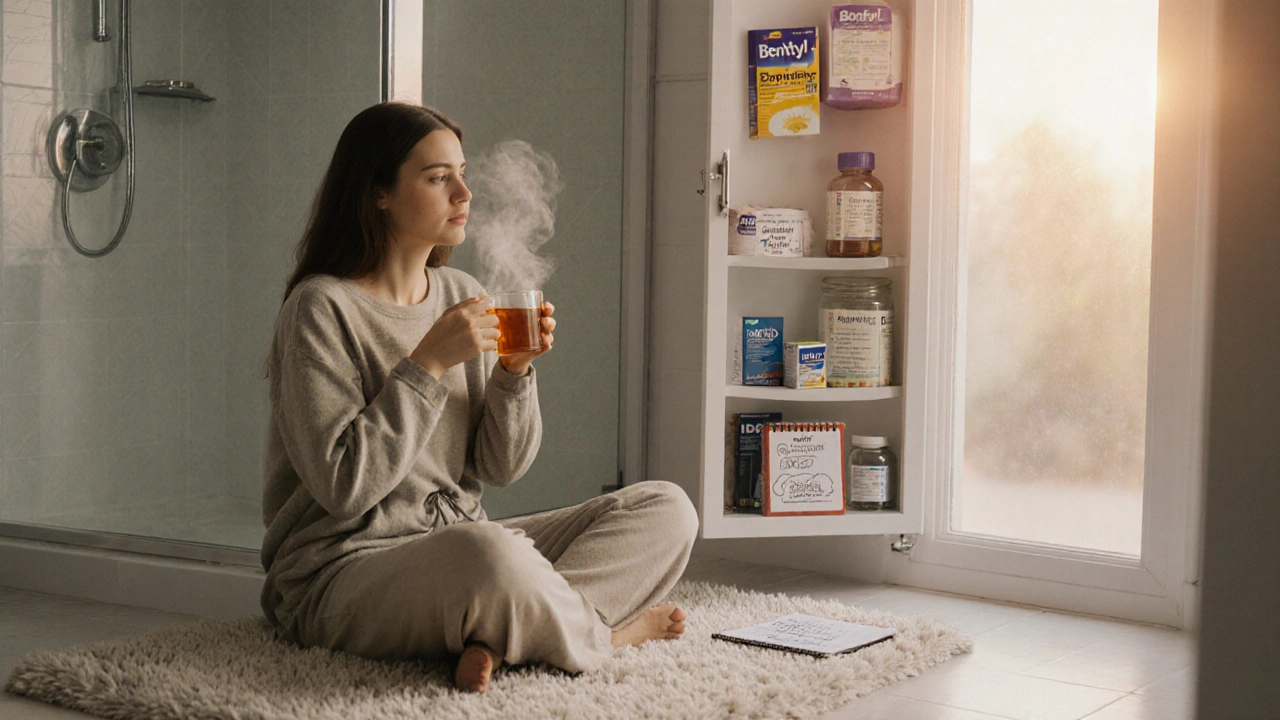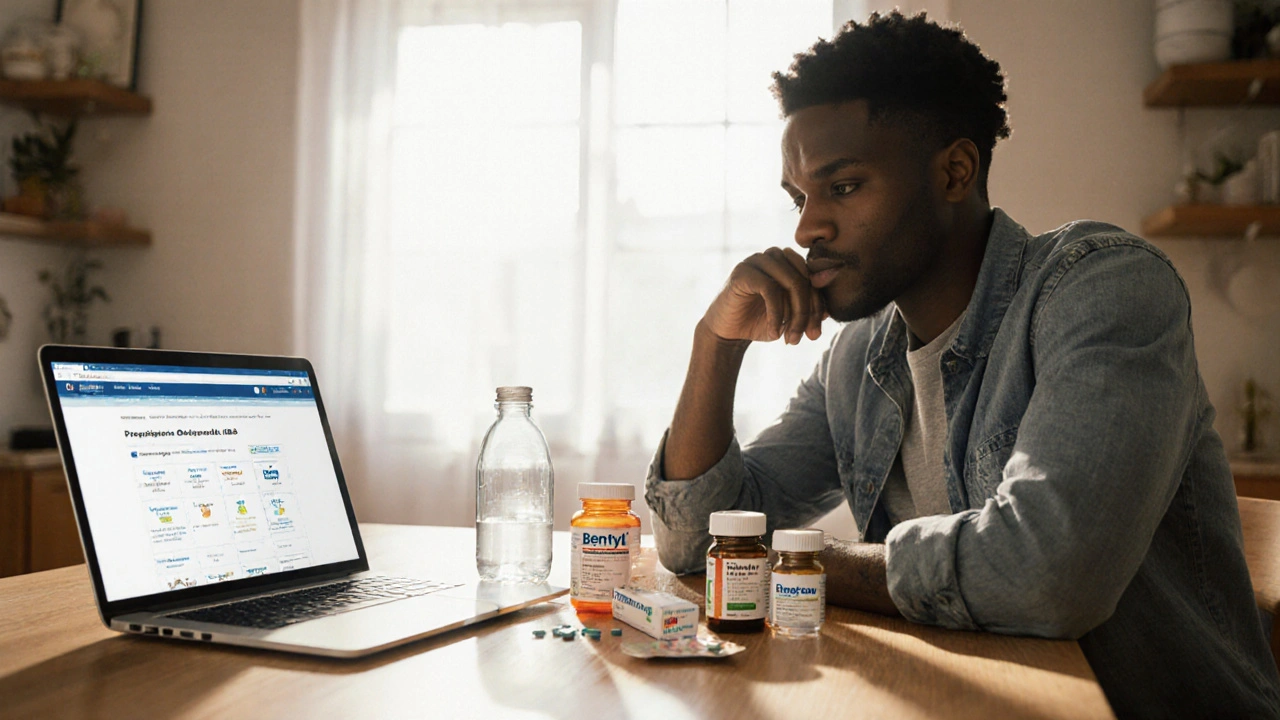IBS Medication Comparison Tool
Select Medications to Compare
| Medication | Drug Class | Typical Dose | Onset (min) | Side Effects | OTC? | Monthly Cost (£) |
|---|---|---|---|---|---|---|
| Bentyl (dicyclomine) | Anticholinergic antispasmodic | 20 mg 3×/day | 30-60 | Dry mouth, dizziness, blurry vision | No | £25-£35 |
| Hyoscyamine | Anticholinergic | 0.125 mg 3×/day | 30-45 | Mild dry mouth, constipation | No | £15-£20 |
| Alverine citrate | Spasmolytic | 120 mg 3×/day | 45-90 | Nausea, headache | No | £18-£25 |
| Mebeverine | Spasmolytic | 135 mg 2×/day | 60-120 | Rare, mild dizziness | No | £30-£40 |
| Peppermint oil (enteric-coated) | Menthol-based antispasmodic | 0.2 ml 3×/day | 60-90 | Heartburn, allergic rash | Yes | £10-£15 |
| Otilonium bromide | Calcium-channel blocker | 40 mg 3×/day | 45-90 | Headache, mild nausea | No (some EU markets) | £12-£18 |
| Dronabinol | Cannabinoid | 2.5-5 mg at night | 30-45 | Dry mouth, drowsiness | No | £40-£60 (special prescription) |
| Loperamide | Anti-diarrheal | 2 mg as needed (max 8 mg) | 15-30 | Constipation, abdominal cramps | Yes | £5-£8 |
TL;DR
- Bentyl (dicyclomine) works well for many, but its anticholinergic side effects can be limiting.
- Hyoscyamine, alverine citrate, and mebeverine are prescription options with similar efficacy and fewer dry‑mouth issues.
- Peppermint oil and otilonium bromide are over‑the‑counter or niche choices that many find gentler.
- Medical cannabis (dronabinol) helps a subset of patients with severe cramping when other drugs fail.
- Cost, availability, and personal tolerance are the main factors when picking an alternative.
When you search for Bentyl alternatives, you’re probably dealing with IBS‑related stomach cramps that haven’t settled with the usual dose. Below is a no‑fluff guide that walks you through what Bentyl actually does, why you might look elsewhere, and how the most common substitutes stack up.
What is Bentyl (Dicyclomine)?
Bentyl is the brand name for dicyclomine, an anticholinergic antispasmodic medication used primarily to treat irritable bowel syndrome (IBS) and other functional bowel disorders. It’s taken orally in 20mg tablets, usually before meals, and works by relaxing the smooth muscle in the gut.
How does dicyclomine work?
Dicyclomine blocks acetylcholine receptors in the gastrointestinal tract, which reduces muscle spasms and the associated pain. The effect kicks in within 30‑60minutes and can last 4‑6hours. While that sounds ideal, the same anticholinergic action can also dry out the mouth, cause blurry vision, and make you feel a bit dizzy.
When to consider an alternative?
Even though Bentyl helps many, several red flags signal it might be time to switch:
- Persistent dry mouth or constipation despite fluid intake.
- Episodes of blurred vision or urinary retention.
- Interactions with other meds such as antihistamines or tricyclic antidepressants.
- Cost concerns - the brand can be pricey compared to generic options.
- Personal preference for a non‑prescription or more natural approach.
If any of these ring true, explore one of the alternatives below.

Top prescription alternatives
Hyoscyamine is a naturally‑derived anticholinergic that shares a similar mechanism to dicyclomine but often causes less severe dry‑mouth symptoms. Typical dosing starts at 0.125mg three times daily, and the medication can be compounded in liquid form for those who can’t swallow pills.
Alverine citrate belongs to the class of spasmolytics that act directly on smooth muscle rather than through the nervous system. This means fewer anticholinergic side effects. The usual dose is 120mg three times a day.
Mebeverine is another smooth‑muscle relaxant, popular in Europe. It’s taken as 135mg twice daily and is praised for a low side‑effect profile, though it’s not always available in the UK without a specialist prescription.
Over‑the‑counter and niche options
Peppermint oil capsules provide a menthol‑based antispasmodic effect that can soothe intestinal muscle tone. Enteric‑coated capsules of 0.2ml taken up to three times a day have shown comparable relief to prescription antispasmodics in several trials.
Otilonium bromide is a calcium‑channel blocker used in several European countries. It’s usually dosed at 40mg three times daily and is noted for minimal systemic side effects.
Dronabinol (synthetic THC) is a medical cannabis derivative that can relax gut smooth muscle and modulate pain pathways. When traditional antispasmodics fail, a low dose of 2.5‑5mg at bedtime may reduce nighttime cramping.
Loperamide isn’t an antispasmodic but an anti‑diarrheal that can indirectly relieve cramping by slowing intestinal transit. It’s available OTC at 2mg tablets, taken as needed up to 8mg per day.
Side‑by‑side comparison
| Medication | Drug class | Typical dose | Onset (minutes) | Common side effects | OTC? | Approx. UK cost (per month) |
|---|---|---|---|---|---|---|
| Bentyl (dicyclomine) | Anticholinergic antispasmodic | 20mg 3×/day | 30‑60 | Dry mouth, dizziness, blurry vision | No | £25‑£35 |
| Hyoscyamine | Anticholinergic | 0.125mg 3×/day | 30‑45 | Mild dry mouth, constipation | No | £15‑£20 |
| Alverine citrate | Spasmolytic | 120mg 3×/day | 45‑90 | Nausea, headache | No | £18‑£25 |
| Mebeverine | Spasmolytic | 135mg 2×/day | 60‑120 | Rare, mild dizziness | No | £30‑£40 |
| Peppermint oil (enteric‑coated) | Menthol‑based antispasmodic | 0.2ml 3×/day | 60‑90 | Heartburn, allergic rash | Yes | £10‑£15 |
| Otilonium bromide | Calcium‑channel blocker | 40mg 3×/day | 45‑90 | Headache, mild nausea | No (some EU markets) | £12‑£18 |
| Dronabinol | Cannabinoid | 2.5‑5mg at night | 30‑45 | Dry mouth, drowsiness | No | £40‑£60 (special prescription) |
| Loperamide | Anti‑diarrheal | 2mg as needed (max 8mg) | 15‑30 | Constipation, abdominal cramps | Yes | £5‑£8 |
How to pick the right option for you
Use the following decision checklist to narrow down the best fit:
- Severity of symptoms: Mild cramping may respond to peppermint oil; moderate‑to‑severe usually needs a prescription antispasmodic.
- Side‑effect tolerance: If anticholinergic dryness is a deal‑breaker, try alverine or mebeverine.
- Cost & insurance coverage: OTC options like peppermint oil and loperamide are cheap, while dronabinol may require special approval.
- Availability: Some drugs (e.g., otilonium bromide) are hard to find in the UK without a specialist referral.
- Medical history: Patients with glaucoma, urinary retention, or heart disease should avoid strong anticholinergics like Bentyl or hyoscyamine.
Talk to your GP or pharmacist about these points. They can help you trial a low‑dose version of a new drug before committing to a full prescription.
Beyond medication: Lifestyle tweaks that boost any treatment
- Low‑FODMAP diet: Cutting fermentable carbs can halve IBS flare‑ups for many people.
- Regular movement: Light walking after meals promotes gut motility and reduces spasm frequency.
- Stress management: Mindfulness, yoga, or CBT have been shown to lower IBS symptom scores.
- Hydration: Drinking 1.5‑2L of water daily can offset constipation caused by anticholinergics.
Combine any of the meds above with these habits for a holistic approach.

Frequently Asked Questions
Can I take Bentyl and peppermint oil together?
Yes, most clinicians consider peppermint oil safe to combine with Bentyl because the oil works locally in the gut, while Bentyl works systemically. Start with a low dose of oil (one capsule) and monitor for any extra heartburn.
Why does Bentyl make me feel dizzy?
Dicyclomine blocks acetylcholine not only in the gut but also in the vestibular system. That can cause a mild drop in blood pressure or affect inner‑ear balance, leading to dizziness. Staying hydrated and standing up slowly can reduce this effect.
Is hyoscyamine stronger than Bentyl?
Hyoscyamine is roughly equivalent in potency to dicyclomine but often feels milder because it’s usually prescribed at lower milligram amounts. Some patients report better relief with fewer side effects, especially if they’re sensitive to dry mouth.
Can medical cannabis replace my antispasmodic?
For a subset of patients with refractory IBS, dronabinol can reduce pain and spasm frequency, but it’s not a first‑line therapy. It works best when traditional antispasmodics have failed or cause intolerable side effects.
Is there an OTC option comparable to Bentyl?
Peppermint oil capsules are the closest OTC alternative. Clinical trials show about 60‑70% of users experience similar cramp relief, though the effect may be slower to appear.

Teknolgy .com
September 29, 2025 AT 21:19
Bentyl feels like a cheap caffeine buzz for the gut, 🍵
Caroline Johnson
September 30, 2025 AT 01:29
If you’re wrestling with the dry‑mouth nightmare that Bentyl delivers, consider swapping to hyoscyamine-its lower dose often translates to milder xerostomia, and the cost drop is evident; still, keep an eye on constipation, because anticholinergics love to slow everything down!
Megan Lallier-Barron
September 30, 2025 AT 04:49
While the hype around hyoscyamine is loud, the subtle whisper of alverine often goes unheard yet delivers smooth muscle relief without the anticholinergic haze 🙃
Kelly Larivee
September 30, 2025 AT 08:59
Peppermint oil is an easy OTC choice-just pop the enteric‑coated caps after meals and you might feel the cramp melt away.
Emma Rauschkolb
September 30, 2025 AT 11:46
🤔 In pharmacodynamic terms, the menthol‑induced calcium channel inhibition in the enteric nervous system reduces spasmogenic activity, making peppermint oil a viable adjunct to antispasmodics.
Kaushik Kumar
September 30, 2025 AT 15:22
Hey folks, if you’re trying out a new regimen, start low and track your symptoms in a journal; many patients find that combining a low‑dose spasmolytic like mebeverine with lifestyle tweaks yields steady improvement!
Mara Mara
September 30, 2025 AT 17:52
While we love a good self‑help plan, remember that the UK NHS typically prefers generic alternatives-so ask your GP about mebeverine as a cost‑effective option; it's not glamorous, but it gets the job done!
Jennifer Ferrara
September 30, 2025 AT 21:46
Esteemed community, the comparative analysis presented herein delineates the pharmacological nuances of each antispasmodic; however, it is imperative to acknowledge the inter‑patient variability that may attenuate the anticipated therapeutic outcomes. Accordingly, clinicians should individualize therapy based upon comorbid conditions and patient preferences.
Terry Moreland
September 30, 2025 AT 23:59
Totally get it-keeping a symptom log helped me see that peppermint worked better on weekdays, while I used mebeverine on stressful days.
Abdul Adeeb
October 1, 2025 AT 03:02
One must consider the contraindications associated with anticholinergic agents, notably in patients with glaucoma, urinary retention, or cardiac arrhythmias; prescribing Bentyl under such circumstances would be clinically indefensible.
Abhishek Vernekar
October 1, 2025 AT 04:59
Absolutely, and adding a brief course of low‑dose dronabinol can be contemplated for refractory cases, provided that legal and regulatory frameworks are observed.
Val Vaden
October 1, 2025 AT 10:32
Bentyl can be a decent start for IBS cramp relief, but it's far from the only option out there.
The anticholinergic side‑effects, especially dry mouth and dizziness, often make people look for something gentler.
Hyoscyamine is a close cousin that many find less harsh, thanks to its lower dosage.
Alverine citrate and mebeverine, both spasmolytics, bypass the cholinergic system altogether, which means fewer mouth‑related complaints.
Peppermint oil, the OTC favourite, delivers menthol‑driven smooth muscle relaxation with a pretty quick onset.
Otilonium bromide, though not widely available in the US, offers a calcium‑channel blocking mechanism that is well‑tolerated in Europe.
For patients who have exhausted conventional meds, dronabinol provides cannabinoid‑mediated analgesia and spasm reduction, albeit with legal hurdles.
Loperamide, while primarily an anti‑diarrheal, can indirectly calm cramps by slowing transit.
Cost is a major factor: Loperamide and peppermint oil sit at the low end, while dronabinol can be pricey and require special prescriptions.
Availability also matters; some drugs like otilonium are only found in certain markets, so checking with a specialist is wise.
Lifestyle tweaks-low‑FODMAP diet, regular walks, stress management-amplify any medication's effect.
Staying hydrated can mitigate the dry‑mouth issue that creeps in with anticholinergics.
If you experience blurred vision or urinary retention, drop the anticholinergic immediately and switch to a spasmolytic.
Talk to your GP about trying a low‑dose trial of mebeverine or alverine before committing to a full prescription.
Keep a simple diary of symptom severity, medication timing, and side‑effects; patterns emerge quickly.
Ultimately, the best IBS relief is the one that balances efficacy, tolerability, and your personal budget 💊✨